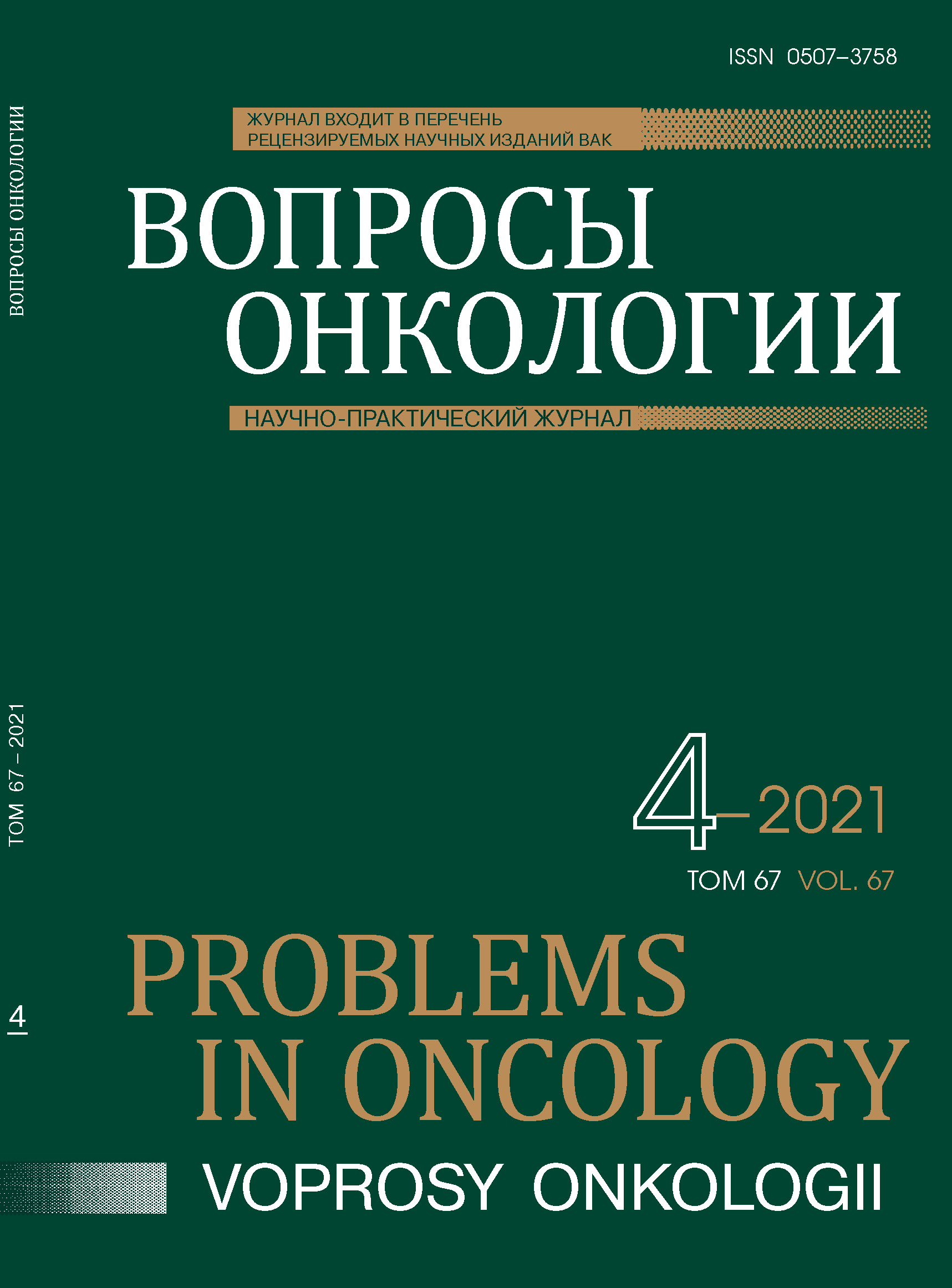Аннотация
Рак молочной железы (РМЖ) — нетипичное проявление для синдрома Линча. Вопрос о степени риска развития РМЖ у носительниц патогенных мутаций в генах синдрома Линча (MLH1, MSH2, MSH6, PMS2) остается открытым. Кроме того, известно, что часть новообразований молочной железы у больных этим синдромом патогенетически связана с наследственной мутацией, а часть возникает совершенно независимо от наследственных дефектов генов системы репарации неспаренных оснований ДНК. При случайном обнаружении таких мутаций у больных РМЖ каждый раз требуется тщательная дифференциальная диагностика между этими категориями опухолей, причем вопрос этот носит сугубо практический характер, так как могут потребоваться изменения в тактике лечения. В данной работе приведено описание клинического случая РМЖ, возникшего у носительницы патогенной мутации в гене PMS2, выявленной случайно. Приведено описание молекулярно-генетических методов: анализа микросателлитных маркеров, выявления «потери гетерозиготности», позволивших в данном наблюдении отнести новообразование к категории случаев, развившихся вне всякой связи с имеющимся у пациентки синдромом Линча.
Библиографические ссылки
Roberts ME, Jackson SA, Susswein LR et al. MSH6 and PMS2 germ-line pathogenic variants implicated in Lynch syndrome are associated with breast cancer // Genet Med. 2018;20(10):1167–1174. https: // doi: 10.1038/gim.2017.254
Nikitin AG, Chudakova DA, Enikeev RF et al. Lynch Syndrome Germline Mutations in Breast Cancer: Next Generation Sequencing Case-Control Study of 1,263 Participants // Front Oncol. 2020;10):666. https: // doi: 10.3389/fonc.2020.00666
Nguyen-Dumont T, Steen JA, Winship I et al. Mismatch repair gene pathogenic germline variants in a population-based cohort of breast cancer // Fam Cancer. 2020;19(3):197–202. https: // doi: 10.1007/s10689-020-00164-7
Wang X, Brzosowicz JP, Park JY. Response to Roberts et al. 2018: cohort ascertainment and methods of analysis impact the association between cancer and genetic predisposition — the tale of breast cancer risk and Lynch syndrome genes MSH6/PMS2. Genet Med. 2019 Sep;21(9):2156–2157. https: // doi: 10.1038/s41436-019-0471-8. Epub 2019 Feb 28
Win AK, Jenkins MA, Dowty JG et al. Prevalence and Penetrance of Major Genes and Polygenes for Colorectal Cancer // Cancer Epidemiol Biomarkers Prev. 2017;26(3):404–412. https: // doi: 10.1158/1055-9965.EPI-16-0693
Ten Broeke SW, van der Klift HM, Tops CMJ et al. Cancer Risks for PMS2-Associated Lynch Syndrome // J Clin Oncol. 2018;36(29):2961–2968. https: // doi: 10.1200/JCO.2018.78.4777
Ionov Y, Peinado MA, Malkhosyan S, Shibata D, Perucho M. Ubiquitous somatic mutations in simple repeated sequences reveal a new mechanism for colonic carcinogenesis // Nature. 1993;363(6429):558-561. https: // doi: 10.1038/363558a0
Buhard O, Suraweera N, Lectard A, Duval A, Hamelin R. Quasimonomorphic mononucleotide repeats for high-level microsatellite instability analysis // Dis Markers. 2004;20(4–5):251–257. https: // doi: 10.1155/2004/159347
Ten Broeke SW, van Bavel TC, Jansen AML et al. Molecular Background of Colorectal Tumors From Patients With Lynch Syndrome Associated With Germline Variants in PMS2 // Gastroenterology. 2018;155(3):844–851. https: // doi: 10.1053/j.gastro.2018.05.020
Loughrey MB, McGrath J, Coleman HG et al. Identifying mismatch repair-deficient colon cancer: near-perfect concordance between immunohistochemistry and microsatellite instability testing in a large, population-based series // Histopathology. 2020. https: // doi: 10.1111/his.14233
Walsh MD, Buchanan DD, Cummings MC et al. Lynch syndrome-associated breast cancers: clinicopathologic characteristics of a case series from the colon cancer family registry // Clin Cancer Res. 2010;16(7):2214–2224. https: // doi: 10.1158/1078-0432.CCR-09-3058
Lotsari JE, Gylling A, Abdel-Rahman WM et al. Breast carcinoma and Lynch syndrome: molecular analysis of tumors arising in mutation carriers, non-carriers, and sporadic cases // Breast Cancer Res. 2012;14(3):R90. https: // doi: 10.1186/bcr3205
Porkka NK, Olkinuora A, Kuopio T et al. Does breast carcinoma belong to the Lynch syndrome tumor spectrum? — Somatic mutational profiles vs. ovarian and colorectal carcinomas // Oncotarget. 2020;11(14):1244–1256. https: // doi: 10.18632/oncotarget.27538
Luchini C, Bibeau F, Ligtenberg MJL et al. ESMO recommendations on microsatellite instability testing for immunotherapy in cancer, and its relationship with PD-1/PD-L1 expression and tumour mutational burden: a systematic review-based approach // Ann Oncol. 2019;30(8):1232–1243. https: // doi: 10.1093/annonc/mdz116
Wen YH, Brogi E, Zeng Z et al. DNA mismatch repair deficiency in breast carcinoma: a pilot study of triple-negative and non-triple-negative tumors // Am J Surg Pathol. 2012;36(11):1700–1708. https: // doi: 10.1097/PAS.0b013e3182627787
Beggs AD, Kousparos G, Hodgson SV. Loss of mismatch repair protein expression in breast carcinoma in patients with Lynch Syndrome: report of two cases // Breast J. 2013;19(2):193–195. https: // doi: 10.1111/tbj.12077
Sorscher S. The Importance of Distinguishing Sporadic Cancers from Those Related to Cancer Predisposing Germline Mutations // Oncologist. 2018;23(11):1266–1268. https: // doi: 10.1634/theoncologist.2017-0681
D'Arcy C, Wen YH, Stadler ZK, Brogi E, Shia J. Synchronous breast cancers with different morphologic and molecular phenotypes occurring in Lynch syndrome: what does the heterogeneity imply? // Am J Surg Pathol. 2011;35(11):1743-1748. https: // doi: 10.1097/PAS.0b013e3182320cff

Это произведение доступно по лицензии Creative Commons «Attribution-NonCommercial-NoDerivatives» («Атрибуция — Некоммерческое использование — Без производных произведений») 4.0 Всемирная.
© АННМО «Вопросы онкологии», Copyright (c) 2021
